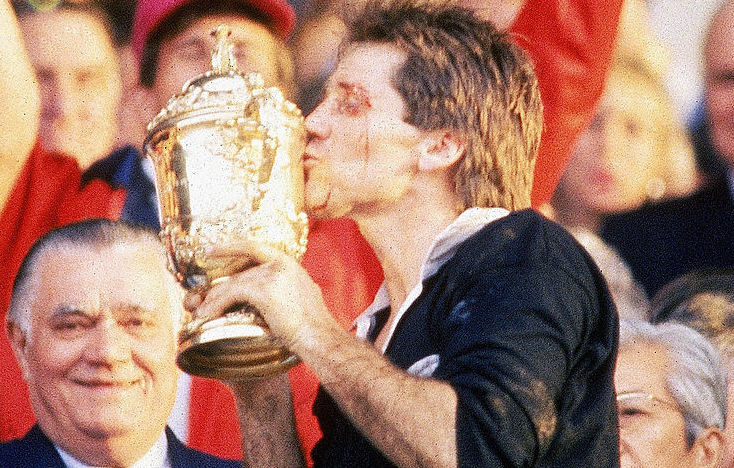In the first instalment of a World Cup series, SA Rugby magazine looks back at the inaugural tournament in 1987, which was hosted and won by New Zealand.
Rugby union has always been resistant to change, and the introduction of a World Cup was no different. The main opposition to the concept was from the home unions (England, Ireland, Scotland and Wales) who regarded themselves as the guardians of the game.
However, in 1985 members of the International Rugby Football Union (IRFU) were asked to vote on a proposal to inaugurate a ‘world rugby cup’.
As Gerald Davies explains in The History of the Rugby World Cup, this was a decision that had been a long time coming. The IRFU was first approached by two companies in the early 1980s. Both were rejected. In 1983, another two proposals were turned down.
In 1984, Australia and New Zealand submitted separate proposals, which were rejected. However, they eventually decided to join forces and made another submission to the board in 1985, which proposed holding the first tournament in 1987 so it wouldn’t clash with the Olympics, Commonwealth Games or Fifa World Cup.
In the end, the World Cup received the green light from six member countries (including South Africa, who knew they wouldn’t be able to take part), while Ireland and Scotland voted against it.
Compared with the 2003 World Cup, the 1987 tournament was a small event. There were only 600,000 fans (compared with 1.9 million in 2003) and another 300 million on TV (compared with 3.4 billion in 2003).
The first World Cup was also devalued by the absence of the Springboks, who had beaten the New Zealand Cavaliers 3-1 in a four-match series the year before. Although it’s impossible to know how they would have done, the Boks would have been expected to reach the final, if not win it.
With no serious challengers, the All Blacks cruised to the inaugural title, smashing France 29-9 in the Eden Park final. New Zealand arrived in Auckland as huge favourites, having scored 269 points to 43 in their previous five games and ran in 40 tries to three.
Buck Shelford had controlled the pack expertly from the back of the scrum, while captain David Kirk (below left) led the backline at scrumhalf. Both played a big part in the final, but it was flyhalf Grant Fox who dominated the game with a 17-point haul. Winger John Kirwan and flank Michael Jones both scored tries, as did Kirk. Scrumhalf Pierre Berbizier scored the only try for the French.
For sheer drama, the best game of the 1987 World Cup was France’s 30-24 semi-final win against the Wallabies.
With full time approaching and the teams locked at 24-24, France counter-attacked and the ball was passed through several hands to the legendary Serge Blanco. The fullback, who was carrying an injury, went for the corner, dived over and famously threw his head back in celebration.
In the other semi-final, Wales were thrashed 49-6 by the All Blacks, but recovered well to beat Australia 22-21 in the playoff for third place. The Welsh had reached the final four by beating arch-rivals England 16-6 and could reflect on a reasonably successful campaign.
PLAYER OF THE TOURNAMENT
MICHAEL JONES
Jones made his All Black debut during the 1987 World Cup, having played a Test for Samoa the year before. The flanker was at his brilliant best during the tournament with ball in hand and at the breakdown.
He scored the first-ever World Cup try in New Zealand’s 70-6 thrashing of Italy and grabbed the first try of the final after Grant Fox’s drop kick had been charged down. The All Blacks loose forwards overpowered the French that day, with Jones the standout performer.
Sadly, Jones’ career was to be badly affected by injury (he played 55 Tests out of a possible 90). He was also left out of the 1995 World Cup squad because of his refusal to play on Sundays (he is a devout Christian).
THREE MAGIC MOMENTS
KIRWAN’S CRACKER (NEW ZEALAND vs ITALY, AUCKLAND)
This one-sided match, won 70-6 by the All Blacks, will always be remembered for John Kirwan’s second try. Shortly after the kick-off that resulted from his first, the winger received the ball not far from his own tryline. With his trademark high-knee action, Kirwan shook off tackles and darted past a dozen defenders to score one of the greatest World Cup tries.
SERGE SINKS WALLABIES (FRANCE vs AUSTRALIA, SYDNEY)
The Tricolores and Wallabies were locked at 24-24 with just minutes remaining in their semi-final. France claimed possession and a long pass managed to scatter Australia’s defence. The ball eventually found Serge Blanco, 25m out from the tryline, and the fullback went for the left-hand corner, diving over the line and throwing his head back in celebration. The final whistle went soon after and France were through to the World Cup final.
KIRK FRIES FROGS (NEW ZEALAND vs FRANCE, AUCKLAND)
Grant Fox’s boot had given New Zealand a 21-3 lead in the World Cup final when flank and Player of the Tournament Michael Jones set up captain David Kirk’s first try. From the restart, Kirk weaved through the French defence, sprinted 60m upfield and gave the try-scoring pass to John Kirwan. The decisive blow had been struck and the All Blacks were the first holders of the World Cup.
Photo: Ross Land/Getty Images





